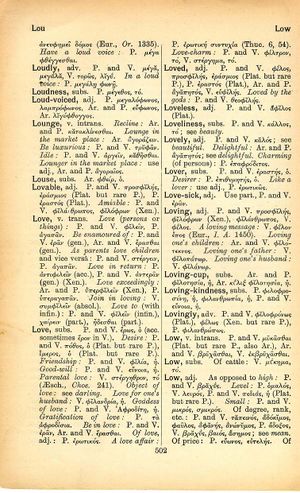love
ἑτέρως ἠδύνατο βέλτιον ἢ ὡς νῦν ἔχει κατεσκευάσθαι → otherwise they could have been constructed better than they are now (Galen, On the use of parts of the body 4.143.1 Kühn)
English > Greek (Woodhouse)
v. trans.
Love (persons or things): P. and V. φιλεῖν, P. ἀγαπᾶν. Be enamoured of: P. and V. ἐρᾶν (gen.), Ar. and V. ἔρασθαι (gen.). As parents love children and vice versa: P. and V. στέργειν, P. ἀγαπᾶν. Love in return: P. ἀντιφιλεῖν (acc.), P. and V. ἀντερᾶν (gen.) (Xen.). Love exceedingly: Ar. and P. ὑπερφιλεῖν (Xen.), P. ὑπεραγαπᾶν. Join in loving: V. συμφιλεῖν (absol.). Love to (with infin.): P. and V. φιλεῖν (infin.), χαίρειν (part.), ἥδεσθαι (part.).
subs.
P. and V. ἔρως, ὁ (acc. sometimes ἔρον in V.). Desire: P. and V. πόθος, ὁ (Plat. but rare P.), ἵμερος, ὁ (Plat. but rare P.). Friendship: P. and V. φιλία, ἡ. Good-will: P. and V. εὔνοια, ἡ. Parental love: V. στέργηθρον, τό (Aesch., Choe. 241). Object of love: see darling. Love for one's husband: V. φιλανδρία, ἡ. Goddess of love: P. and V. Ἀφροδίτη, ἡ. Gratification of love: P. τὰ ἀφροδίσια. Be in love: P. and V. ἐρᾶν, Ar. and V. ἔρασθαι. Of love, adj.: P. ἐρωτικός. A love affair: P. ἐρωτικὴ συντυχία (Thuc. 6, 54). Love-charm: P. and V. φίλτρον, τό. V. στέργημα, τό.

